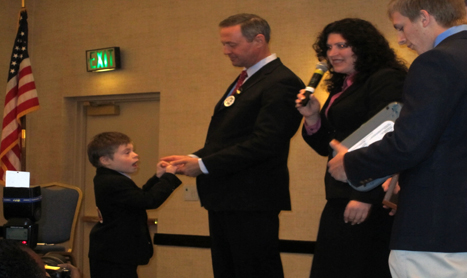ANNAPOLIS – Gov. Martin O’Malley told advocates for the developmentally disabled Tuesday that his proposed budget provides more support for their needs, and that he’ll assure lost millions will be returned to the Developmental Disabilities Administration.
O’Malley spoke to the crowd at the annual Developmental Disabilities Lobby Day about his FY2013 budget priorities, which include an increase of $30 million in total funds for services from the previous year. That brings this year’s total funding to more than $837 million.
O’Malley also revealed a three-year plan to return lost funds to the disabilities administration, after approximately $28.5 million of unspent state money had to be sent back to the general fund last year.
Video by Whitney Harris/Capital News Service
To protect against it happening in the future, O’Malley announced a proposal for a non-lapsing trust fund so that future unspent money would remain in the trust instead of reverting back to the treasury.
Hundreds participated in the event, advocating for equal job opportunities and increased funding for services to help the developmentally disabled live happy, productive lives.
“What I hope we’re able to do together is to create a system and administration that is far better than any in the country, and make sure … that no individual slips through the cracks,” O’Malley said.
Developmental disability advocates noted many key victories in recent years, including the closing of The Rosewood Center, a troubled state-run institution, in 2008.
Last year’s alcohol tax increase was also a victory for the developmentally disabled community, as portions of the money raised are allocated to health care services in this year’s budget.
However, there is still progress to be made, as more than 6,500 adults and children remain on the disabilities administration waiting list, said Brian Cox, executive director of the Maryland Developmental Disabilities Council. The waitlist is down from approximately 19,000 three years ago.
Participants at the lobby day were introduced to the Maryland Developmental Disabilities Coalition’s newest initiative, the Real Lives campaign, which advocates for families and direct support staff, which are essential to helping a disabled individual live a productive life.
“Underfunding is the real disability.” Ken Capone, public policy coordinator for People On the Go of Maryland, told the crowd. “We need to be able to live real lives of our choosing in our community.”
Participants next marched to Lawyers’ Mall, where the group held a rally and spoke to legislators. They hoped to encourage legislators to keep O’Malley’s proposed budget intact.
“We feel very positive about the budget that the governor has introduced,” said Laura Howell, executive director of the Maryland Association of Community Services. “We will focus on advocacy for the budget.”
For many, these funds are essential to the wellbeing of a person with developmental disabilities.
Crystal Holman’s son Hayden was diagnosed with severe autism at 2. Holman was put on the waitlist to receive funding for her son and called the disabilities administration every day for eight years, she said.
After finally moving off the waitlist, Holman’s son has made great progress as a result of working with a behavioral specialist. The improvement could not have been made without the necessary funding.
“I know because of these services, my son has a chance,” Holman said.
“Whether we move forward or whether we move back is a choice,” O’Malley said. “We choose progress, progress on the road to real lives,” O’Malley said.
Capital News Service’s Aaron Carter contributed to this report.

